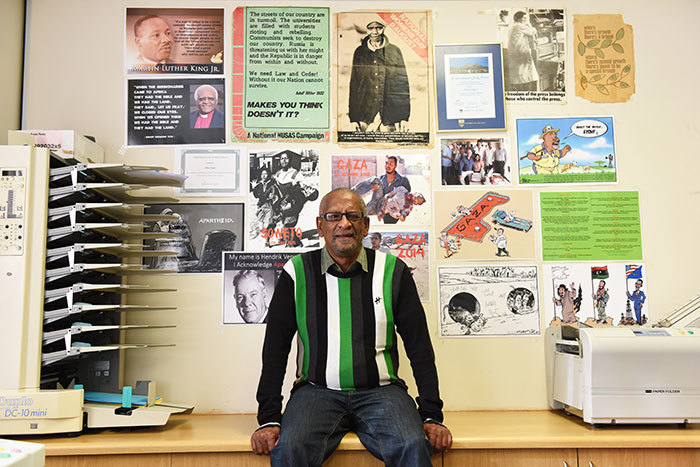'Despite the hardship, those were some of the best years of my life'
20 April 2015 | Story by Newsroom
Manie Fagan's office was a regular stop on campus for security police; and he recalls the days when the station manager of UCT Radio was a government informer.
This year, Manuel (Manie) Fagan will receive a long-service award for 45 years of work at UCT. Today he is the print coordinator for the SRC Press, which produces publications and print media for student societies and organisations; but he started out as a cleaner, in 1970.
He was quickly promoted to printing student material, which in the 1970s and 1980s included many banned posters and pamphlets. Manie remembers the weekly police raids on their office starting around 1976, when the struggle began to gain momentum following the Soweto uprising. "We would print pamphlets and posters that would be distributed throughout the city. The print runs ran into the thousands," he recalls.
He never feared detention, because student activists had to put their own names on printing requisition forms; and they were the ones the police were really after. "I must have given hundreds of statements to the police, because as things started getting more heated in the 1980s, the police would come at least once a day."
They could never find evidence that the pamphlets or posters were actually printed on site, however. As a result, and to Manie's knowledge, their raids never resulted in any convictions. "As soon as the material was printed, it would be removed from our office."
Students taunted the police by leaving behind one print copy, but the metal printing plates would be discarded. "I had to testify in court on numerous occasions, but without the printing plates, they could not get a conviction."
Another measure taken to avoid police action was to print in the late afternoon and through the night.
For Manie, campus at the time was a cloak-and-dagger environment: he recalls how his every move was watched by the police and how the manager of UCT Radio was a government spy: : "A man came to see me one day at home (in Heideveld). He told me my whole life story, and offered me a job. I told the then-SRC president, I think it was Fink Haysom, of this visit. He spoke to the then-principal, Sir Richard Luyt, and told me I needn't worry, that the guy wouldn't bother me anymore."
Manie refers to the struggle period as some of the best years of his life. "Sure, it was nerve-wracking; but there was always something going on."
Return to A people's history of struggle main story
 This work is licensed under a Creative Commons Attribution-NoDerivatives 4.0 International License.
This work is licensed under a Creative Commons Attribution-NoDerivatives 4.0 International License.
Please view the republishing articles page for more information.










